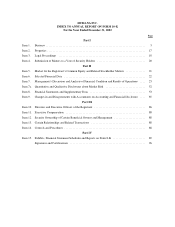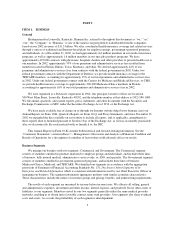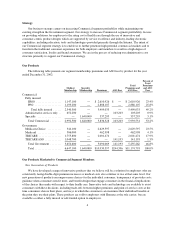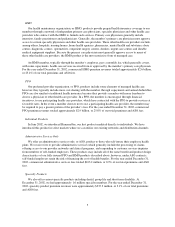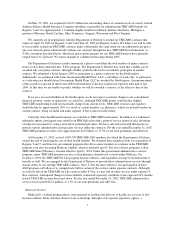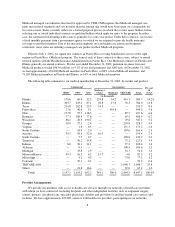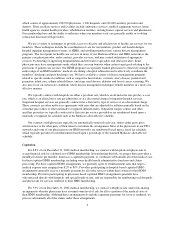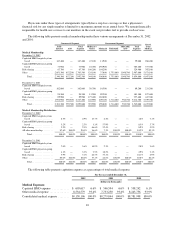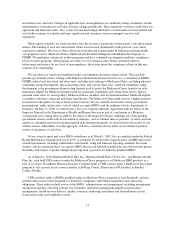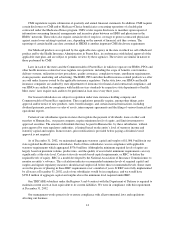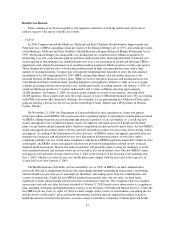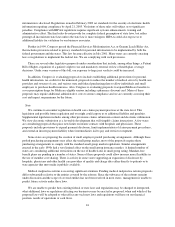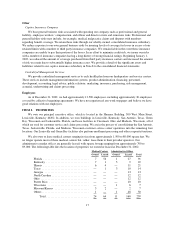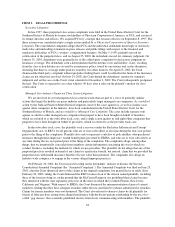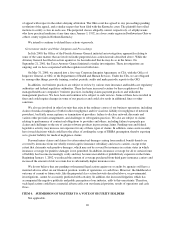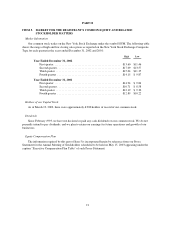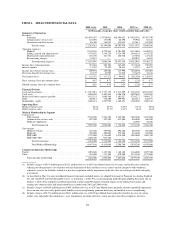Humana 2002 Annual Report Download - page 18
Download and view the complete annual report
Please find page 18 of the 2002 Humana annual report below. You can navigate through the pages in the report by either clicking on the pages listed below, or by using the keyword search tool below to find specific information within the annual report.Sales and Marketing
Individuals become members of our commercial HMOs and PPOs through their employers or other groups
which typically offer employees or members a selection of health insurance products, pay for all or part of the
premiums and make payroll deductions for any premiums payable by the employees. We attempt to become an
employer’s or group’s exclusive source of health insurance benefits by offering a variety of HMO, PPO and
specialty products that provide cost-effective quality health care coverage consistent with the needs and
expectations of the employees or members.
We use various methods to market our commercial, Medicare+Choice and Medicaid products, including
television, radio, the Internet, telemarketing and mailings. At December 31, 2002, we used approximately
39,000 licensed independent brokers and agents and approximately 520 licensed employees to sell our
commercial products. Many of our employer group customers are represented by insurance brokers and
consultants who assist these groups in the design and purchase of health care products. We generally pay brokers
a commission based on premiums, with commissions varying by market and premium volume.
At December 31, 2002, we employed approximately 610 sales representatives, who are each paid a salary
and/or per member commission, to market our Medicare+Choice and Medicaid products in the continental U.S.
We also employed approximately 330 telemarketing representatives who assisted in the marketing of
Medicare+Choice and Medicaid products by making appointments for sales representatives with prospective
members.
Risk Management
Through the use of internally developed underwriting criteria, we determine the risk we are willing to
assume and the amount of premium to charge for our commercial products. In most instances, employer and
other groups must meet our underwriting standards in order to qualify to contract with us for coverage. Small
group reform laws in some states have imposed regulations which provide for guaranteed issue of certain health
insurance products and prescribe certain limitations on the variation in rates charged based upon assessment of
health conditions.
Underwriting techniques are not employed in connection with Medicare+Choice products because CMS
regulations require us to accept all eligible Medicare applicants regardless of their health or prior medical history.
We also are not permitted to employ underwriting criteria for the Medicaid product, but rather we follow CMS
and state requirements. In addition, with respect to our TRICARE business, we do not employ any underwriting
techniques because we must accept all eligible beneficiaries who choose to participate.
Competition
The health benefits industry is highly competitive and contracts for the sale of commercial products are
generally bid or renewed annually. Our competitors vary by local market and include other publicly traded
managed care companies, national insurance companies and other HMOs and PPOs, including HMOs and PPOs
owned by Blue Cross/Blue Shield plans. Many of our competitors have larger memberships and/or greater
financial resources than our health plans in the markets in which we compete. Our ability to sell our products and
to retain customers is, or may be, influenced by such factors as benefits, pricing, contract terms, number and
quality of participating physicians and other managed health care providers, utilization review, claims
processing, administrative efficiency, relationships with agents, quality of customer service and accreditation
results.
Government Regulation
Government regulation of health care products and services is a changing area of law that varies from
jurisdiction to jurisdiction. Regulatory agencies generally have broad discretion to issue regulations and interpret
12


